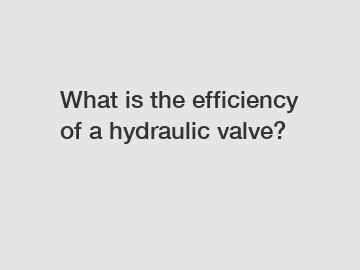Feb. 12, 2024
Mechanical Parts
In the vast mechanical world, hydraulic systems play an integral role in powering a wide range of applications. Efficiently controlling fluid flow within these systems is essential for their optimal performance, and that's where hydraulic valves come into play. These nifty devices regulate the flow of fluid, ensuring energy conservation, precise control, and enhanced productivity. In this blog, we delve into the efficiency of hydraulic valves, shedding light on the factors that influence their performance and exploring the benefits they bring to various industries.
Understanding Hydraulic Valve Efficiency:
Hydraulic valves are crucial components that allow or restrict fluid flow within a hydraulic system, manipulating force and motion accordingly. Efficiency, in this context, refers to how well these valves convert input energy into useful output, all while minimizing energy losses. From open-center valves for mobile machinery to proportional valves used in industrial applications, the efficiency of hydraulic valves directly impacts system performance, power consumption, and overall productivity.

Factors Affecting Efficiency:
1. Internal Leakage: Internal leakage within hydraulic valves can significantly affect efficiency. Seals and components wear over time, leading to minute leaks that reduce the valve's effectiveness. Manufacturers utilize advanced designs and materials to minimize internal leakage and enhance efficiency. Regular maintenance and seal replacements are also necessary to optimize performance.
2. Pressure Drops: Pressure drops occur when fluid flows through valves and various flow control components. These drops lead to energy loss and diminished system efficiency. Consequently, hydraulic valve manufacturers strive to minimize pressure drops by designing valves with low resistance, streamlined passages, and efficient flow paths.
3. Flow Control Accuracy: Precise control over fluid flow is crucial for achieving optimal efficiency in hydraulic systems. By modulating flow rates, the valves help maintain stability, prevent restricted flow, and conserve energy. Advanced digital control technologies, such as proportional valves, ensure accurate flow control, resulting in improved performance and reduced energy requirements.
Benefits of Efficient Hydraulic Valves:
1. Increased Productivity: Efficient hydraulic valves enable rapid and precise control over fluid flow, facilitating seamless operation in various applications. This enhanced productivity not only saves time but also boosts overall output, leading to increased profitability.
2. Energy Conservation: One of the most significant advantages of utilizing efficient hydraulic valves is the conservation of energy. Minimizing pressure drops, internal leakage, and flow restrictions reduces energy losses, resulting in lower power consumption and greener operations. Energy-efficient hydraulic valves can contribute to significant cost savings for industries that rely heavily on hydraulic systems.
3. Durability and Reliability: By minimizing internal leakage, flow restrictions, and pressure losses, efficient hydraulic valves can extend the lifespan and reliability of hydraulic systems. Well-designed valves with reduced wear and tear exhibit enhanced durability, requiring fewer maintenance interventions and associated downtime.
Applications of Efficient Hydraulic Valves:
1. Manufacturing and Industrial Processes: From heavy machinery and robotic arms to assembly lines, efficient hydraulic valves play a crucial role in achieving seamless automation, precision control, and optimal energy utilization in industrial settings.
2. Construction and Excavation: Hydraulic systems are widely employed in construction and excavation equipment. Efficient hydraulic valves enable precise control over the movements of cranes, loaders, and excavators, resulting in improved safety, productivity, and fuel efficiency.
3. Automotive and Transportation: Hydraulic systems in automobiles and transportation rely on efficient valves to control functions such as power steering, suspension, and braking. Optimizing these valves enhances vehicle performance, comfort, and fuel economy.
Conclusion:
In today's ever-evolving technological landscape, the efficiency of hydraulic valves becomes increasingly paramount. By minimizing energy losses, optimizing flow control, and ensuring accurate performance, efficient hydraulic valves enable industries to operate more productively while conserving valuable resources. As manufacturers continue to innovate in materials, designs, and flow control technologies, hydraulic systems will become even more integral to our daily lives, meeting the demands of a sustainable and energy-efficient future.
Want more information on solenoid directional valve Manufacturer, directional servo valves suppliers, electromagnetic directional valve manufacturer? Feel free to contact us.
If you are interested in sending in a Guest Blogger Submission,welcome to write for us!
All Comments ( 0 )